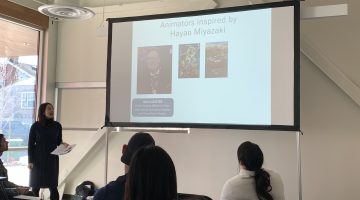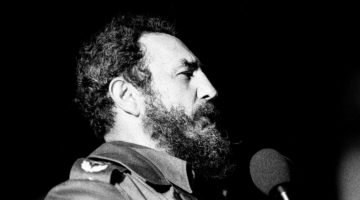
Columnist Daniel Coffey and other USAC students pose with their cooking instructor and family in Havana, Cuba on Wednesday, Jan. 7, 2015.
The response from friends was fairly common: “why on earth would you want to travel to Cuba? Aren’t you afraid?” They would reveal their ethnocentric perceptions of the country, telling me how “crazy” the Castros were and how impoverished the people would be. Though I often shrugged their concerns away, I had to be honest with myself; I did have some trepidation about taking a USAC course in Havana, but I decided to never waver in my decision.
I had to constantly defend myself, explaining what a valuable cultural experience I thought Cuba could provide and how I wanted to learn about a society divergently different from my own. As a person who had never traveled outside of North America, I felt that I had a lot to learn from the Cuban people. If I wanted to be the global citizen I aspire to be, I needed to jump in head first — so I did.
Calling my trip to Cuba eye-opening simply would not capture the complexity of the experience. In the most literal sense of the phrase, it was a once in a lifetime opportunity. From witnessing religious ceremonies that exist in only one Cuban village, to viewing world-class art at “El Museo de Bellas Artes,” the things I saw on my trip taught me more about the world than any textbook I’ve read to date.
Furthermore, observing the effects of an authentic socialist system forged an entirely new viewpoint of the world that I would have never considered otherwise. It’s easy to believe you understand socialism in your Econ 102 class, but until you see the ration books, state-owned markets and homes that are all qualitatively equal, your understanding will never scratch the surface of the motley system.
In going to foreign countries — especially one as unique as Cuba — you are able to learn through experience as opposed to cramming information the night before a test. You grow and understand things differently, not because you have to, but because the world is challenging you to learn and adapt. That’s what makes traveling at a young age so important: the profound knowledge you gain will shape the way you choose to live the rest of your life.
That being said, perhaps one of the most important lessons I learned is the universality of the human experience. Although I did not have a formal host family in Cuba, the program professors and guides became a family that I will not soon forget. My professor of poetry, Jose, along with his wife, Odalys, impacted me in a way I may never be able to properly express to them. Throughout my Cuban cooking class (which I would highly recommend should you find yourself studying abroad in Cuba through USAC) Odalys and Jose opened their home to me.
Over our home-cooked meals, we would discuss culture, society and even the topic many might avoid: the relationship between the United States and Cuba. Having left the United States just two weeks after President Barack Obama’s historic, sanction-reducing announcement, I arrived in Havana on the precipice of a changing world. Through our conversations, Jose and Odalys painted a vivid picture of a country that has struggled but never relinquished hope for a better tomorrow.
We laughed; we debated; we pushed one another to see the world through a new lens. They were open and candid, ensuring me that I should feel comfortable to ask any question. As cheesy as this may sound, they opened up more than just their home; they opened up their hearts.
It was in those moments that I truly understood the shared beliefs, fears and experiences that transcend culture and language — the types of experiences that all people have because they’re human. In those dinnertime conversations, I found love, mentorship and support — qualities I believe we often take for granted on a day-to-day basis.
My trip to Cuba taught me that, in order to be the best version of myself, I need to understand the world outside of the boundaries of my own country. The lessons you learn in a classroom may help in your career one day, but the lessons you learn while traveling will help you become a better person for life.
My best advice is to stop waiting for the “right time.” This current moment is the right time. As a college student, you have a responsibility to take advantage of these opportunities at a time that will shape you as you enter adulthood. Put down the newspaper right now, walk into USAC and start planning your adventure. There is a world of beautiful people, places and experiences waiting for you. All you have to do is get up and go.
Daniel Coffey studies journalism. He can be reached at danielcoffey1113@gmail.com and on Twitter @TheSagebrush.











